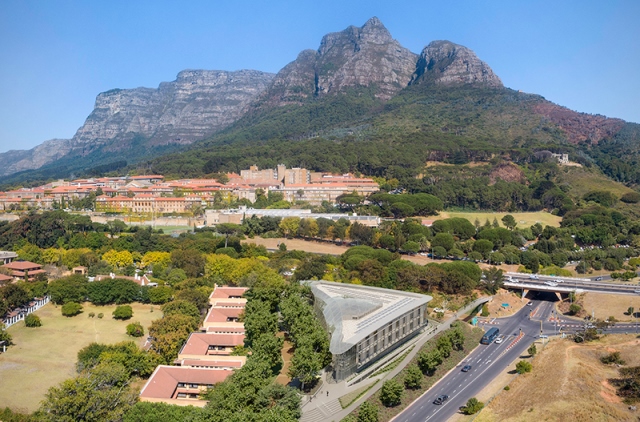Since its inception in 2015, the Hasso Plattner School of Design Thinking-d-school-has been temporarily located at the University of Cape Town Graduate School of Business (UCT GSB) V&A Waterfront campus.
But now a new building for Africa’s first school dedicated to design thinking is officially under construction on UCT’s middle campus, with the team having broken ground earlier this month.
The Hasso Plattner Foundation is funding the new d-school building, which will play a strategic role as part of UCT’s Vision 2030.
“This provides the impetus for the d-school to grow continuously to become the African centre of excellence in design-led thinking. It aligns with UCT’s Vision 2030 to position itself as a global university in Africa, focused on unleashing human potential for a fair and just future,” according to the foundation.
The physical growth of the d-school will help to further develop and deliver sought-after, uniquely African programmes.
The donation to UCT is a commitment to ensure that design thinking reaches the university’s 29 000 students and enhances their educational experience.
“The physical growth of the d-school will help to further develop and deliver sought-after, uniquely African programmes empowering people in the mindset of design-led thinking to enable the creation of impactful human-centred solutions in an ever-changing world.”
Unleashing potential
UCT’s vice-chancellor, Professor Mamokgethi Phakeng, said that the university is “honoured to be among only two other institutions: Stanford University in the United States and the University of Potsdam in Germany” to have a d-school.
“In the last five years, as the d-school has established its programmes within our institution, we have seen how design thinking can unleash our graduates’ potential to lead within diverse contexts, work across disciplines and tap into their creativity to respond to real-world challenges,” said Professor Phakeng.
This is a very good time to be building a place for the d-school to do its excellent and transforming work.
“The many problems raised by the coronavirus pandemic have put into sharp focus not only how much the world needs this kind of creative thinking, but how much Africa shares with the rest of the world. This is a very good time to be building a place for the d-school to do its excellent and transforming work.”
A place for co-creation and collaboration
At the d-school, students learn about design thinking, a globally recognised creative approach to solving complex problems. The process draws on collaboration in diversity while aiming to foster a deeper understanding of problems to ensure impactful responses.
The UCT d-school’s founding director, Richard Perez, said that the new building will be a place for co-creation and collaboration across the university’s faculties.
“It will be a place on campus that will attract students and staff from different disciplines to come together to learn the mindset and the practice of design thinking as a driver of innovation and new outcomes within our African context,” he said.
“The teaching and learning spaces in the building will also be very unique as these will support the concept of flexible spaces where students are able to build their own classrooms.”
This building is sending a message that UCT understands the importance of remaining relevant by creating new teaching and learning environments.
He continued: “This building is sending a message that UCT understands the importance of remaining relevant by creating new teaching and learning environments – both face to face and virtual – that are needed in order to capacitate students for the future.
“It is a move away from the traditional lecture theatres to developing spaces and teaching environments that drive co-creation, collaboration and innovation. And a space where industry and students from different faculties and disciplines can learn to work together in multidisciplinary and transdisciplinary teams on real-world, complex challenges.”
As a department of the Centre for Higher Education Development (CHED), the d-school’s mission includes a focus on research and practice in higher education teaching, learning and curriculum, and its programmes will have implications for staff, student and curriculum development.
d-school design
The d-school’s new home at UCT will have multiple floors and a standout architectural and interior design.
The new four-storey building is targeting a 6-star Green Star rating from the Green Building Council South Africa (GBCSA). It aims to be the first 6-star Green Star-rated academic building in Africa.
“Environmental sustainability is an essential value for UCT, which aligns well with the Hasso Plattner Foundation’s values, and thus together this project was able to be more ambitious in its green building objectives by going well beyond UCT’s minimum requirement for new buildings (4 star) to targeting a 6-star green building rating, which equates to ‘World Leadership’ according to the GBCSA,” said Manfred Braune, UCT’s director for environmental sustainability.
“The integrated green building design of the space aligns incredibly well with the d-school’s approach to learning and problem-solving, and it’s therefore a perfect fit in terms of accommodating world-class thought leadership.”
Construction of the new d-school building is set to be complete by early 2022.
Also Read
Number of Chinese construction workers in Africa diminishing-report
Dream to construct Africa’s tallest building still on- Developers

